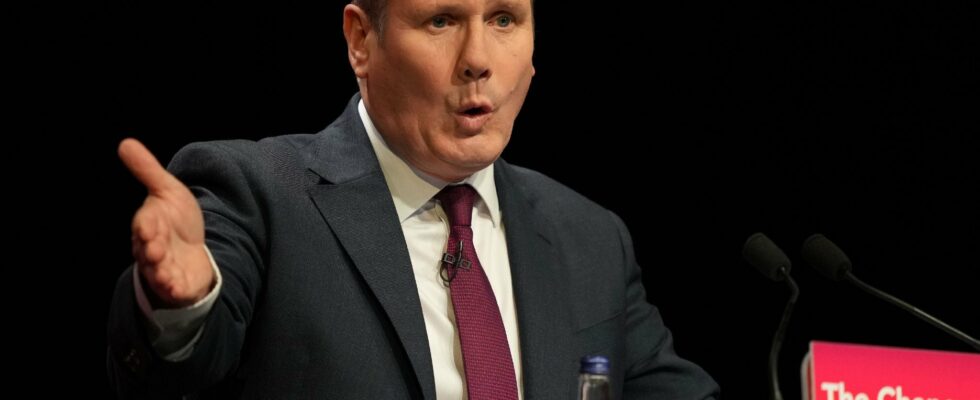He is the big favourite in the general elections scheduled for Thursday 4 July in the United Kingdom. The Labour Party is expected to emerge victorious in this election, which is to renew the 650 seats in the House of Commons. Other parties will also try to obtain as many seats as possible, including the Conservative Party (Tories) of Rishi Sunak, outgoing Prime Minister, the Liberal Democrats, the Scottish National Party, Reform UK of Nigel Farage and the Green Party.
It is an election that seems to be a foregone conclusion and with Labour determined to take no risks, the campaign has not unleashed passions. And if the British are yearning for change after fourteen years of Conservative government, it is without illusions or excessive enthusiasm that they are preparing to welcome this new majority.
Voter mobilization or weariness?
Labour has made it clear that it does not have a “magic wand” to transform the country instantly. Faced with this reality, the big question is: will voters turn out on Thursday? Labour leaders are expressing deep concern, especially given that many seats are up for grabs by a very tight margin. The crucial issue is voter turnout, which reached 67.3% in 2019, serving as a key indicator of how Britons feel about their political class.
A resounding victory or another failure?
A rare surprise in this campaign: Nigel Farage, the 2016 Brexit champion who has since become the face of the anti-immigration and anti-establishment hard right on television sets, has ended up launching himself into the race for the leadership of the Reform UK party. Will the cheekiness of the 60-year-old former trader and MEP, who took part in a reality TV show in the jungle last year, allow his party to access Parliament? Despite his rise in the polls, the single-round voting system makes the task difficult.
If his eighth attempt to enter the Palace of Westminster is successful and he is elected MP for the seaside resort of Clacton-on-Sea (East of England), Nigel Farage, appreciated by former American president Donald Trump, will have an unprecedented visibility. If he fails, the votes in favour of Reform UK (credited with 16% in the latest polls) will be decisive in deciding between Labour and Tories in many constituencies.
Tories on the decline?
What will remain of Margaret Thatcher and Boris Johnson’s party on July 5? After fourteen years of Conservative power with the difficult Brexit period, these elections herald the end of a reign. Despite the sudden appearance of former Prime Minister Boris Johnson, who has declared his support for candidate Rishi Sunak, the Tories still risk the worst defeat of their party. Several polls expect a historically low number of MPs since its creation in 1834, and even lower than the 141 MPs of 1906.
The British media are already speculating about who will succeed Prime Minister Rishi Sunak as leader of the Tories. It remains to be seen which personalities will save their seats as MPs and what direction this party will take, centrist under David Cameron (2010-2015) then drifting to the right. If Reform UK succeeds, some Tories would not view an alliance with disfavor, others are noisily refusing it.
Scotland: fragility of the independence movement?
Things are going badly for the Scottish National Party (SNP), which has dominated local politics for about fifteen years. The surprise resignation of the charismatic former First Minister Nicola Sturgeon in 2023 destabilized it, and her successor only lasted a year. The left-wing party is still the subject of an investigation into its funding and lacking a strategy for gaining independence, a fight that was revived for a time by Brexit but blocked by London.
First Minister John Swinney says winning a majority of Scotland’s 59 constituencies would give him the legitimacy to start fresh talks on a new referendum with a Labour government in London. The SNP currently holds 43 seats. But Labour looks set to use its national momentum to reclaim the territory it held until 2010.
A Lib Dem resurgence?
Sliding down a giant slide, tumbling off a paddle board, answering an interview on a ride or bungee jumping, centrist Ed Davey gave his all during an offbeat campaign.
He has taken it upon himself to entertain the gallery in order to make his Liberal Democrat party exist in the face of the Starmer/Sunak duel, whose campaigns have not shone with their brilliance, and to highlight issues such as river pollution or the mental health of the British.
The Lib Dems are credited with around 11% of the vote in the polls and their presence in the south of England gives them hope of obtaining between 50 and 60 seats, compared to 11 in 2019. A level comparable to their breakthrough in 2010, when they governed with the Conservatives.
